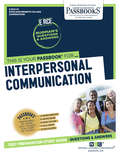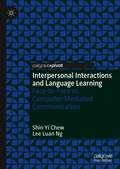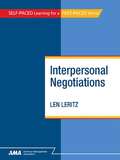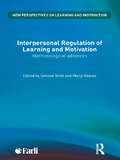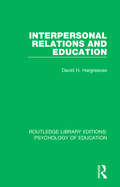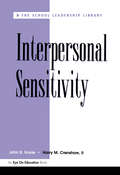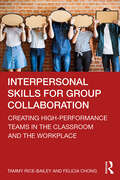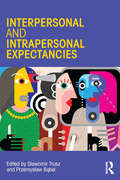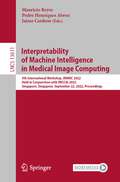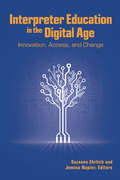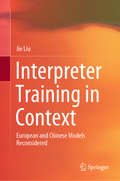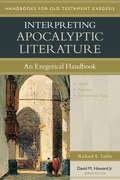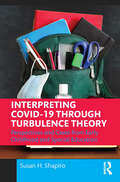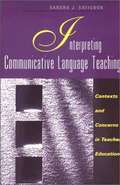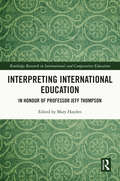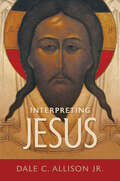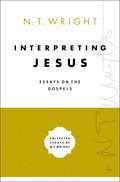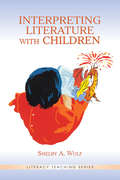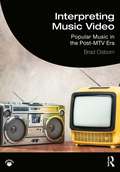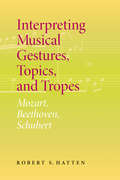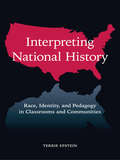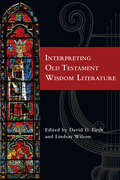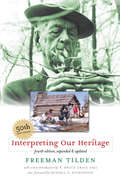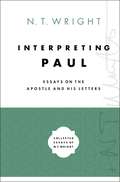- Table View
- List View
Interpersonal Communication: Passbooks Study Guide (Excelsior/Regents College Examination Series)
by National Learning CorporationThe Excelsior/Regents College Examinations (E/RCE) offer you an opportunity to obtain recognition for college-level learning and consists of exams designed to demonstrate achievement and mastery of various college-level subjects, such as the Arts and Sciences, Business, Criminal Justice, Education, Health and Nursing. The E/RCE Interpersonal Communication Passbook® prepares you by sharpening knowledge of the skills and concepts necessary to succeed on the upcoming exam and the college courses that follow. It provides a series of informational texts as well as hundreds of questions and answers in the areas that will likely be covered on your upcoming exam.
Interpersonal Interactions and Language Learning: Face-to-Face vs. Computer-Mediated Communication
by Shin Yi Chew Lee Luan NgThis book takes as its starting point the assumption that interpersonal communication is a crucial aspect of successful language learning. Following an examination of different communicative models, the authors focus on traditional face-to-face (F2F) interactions, before going on to compare these with the forms of computer-mediated communication (CMC) enabled by recent developments in educational technology. They also address the question of individual differences, particularly learners' preferred participation styles, and explore how F2F and CMC formats might impact learners differently. This book will be of interest to students and scholars of computer-mediated communication (CMC), computer-assisted language learning (CALL), technology-enhanced language learning (TELL), language acquisition and language education more broadly.
Interpersonal Negotiations Breaking Down the Barriers
by Len LeritzFinally…a negotiation framework that encourages a positive outcome for both parties. This book takes the "win/win" concept a step further to make negotiating a more gratifying experience—even if you don’t get exactly what you want. Interpersonal Negotiations: Breaking Down the Barriers builds on mutual understanding and respect for each other's needs and provides a proven framework for fulfilling them. You’ll discover the secrets that can help turn an adversary into an advocate. You will learn how to: • Ensure a safe, fair, and effective negotiation process • Direct the negotiation process to create mutual understanding and acceptance • Recognize and understand your own needs and those of the other person • Make it easy for others to understand your needs • Be creative and persistent to address and resolve blocks to successful negotiation • Assess the other person's behavioral and emotional responses • Acknowledge your own and the other person's perceptions and beliefs • Avoid getting mired in the process
Interpersonal Regulation of Learning and Motivation: Methodological Advances (New Perspectives on Learning and Instruction)
by Simone Volet Marja VaurasInterpersonal Regulation of Learning and Motivation is the first book in the field to focus on major methodological advances in research on interpersonal regulation of learning and motivation. Interest in developing ways of capturing the dynamics of interpersonal regulation in real-life learning interactions is growing rapidly. Understanding these dynamics is particularly timely given the increased use of collaborative learning activities in schools and university settings, as well as through face-to-face and computer supported collaborative learning (CSCL) environments. While groups and collections of individuals in social interaction are expected to bring their own motivations and goals to the learning situations, it is also assumed that these are further shaped through interaction, as the group activity evolves. Research methodology publications in the field of learning, regulation and motivation are still dominated by a focus on the individual. The study of collaborative learning at both conceptual and methodological level has not incorporated the significance of social regulatory processes of learning and motivation. This is a new development in the field and one covered by this book. The book contains numerous illustrations of innovative: Methodological approaches to study and interpret the dynamics of interpersonal regulation Data sources and data representations to capture scaffolded instruction Theory-based analytic methods to investigate interactions in real-life collaborative learning Coding systems and social software tools for gathering and analysing interactive data. Interpersonal Regulation of Learning and Motivation brings together the work of scholars who have been studying interpersonal regulation of learning and motivation at the boundaries of the individual and the social, and who have made original methodological contributions to the study of interactive learning environments. In combination, their work provides a range of distinctive and original conceptual and methodological contributions to this under-examined and vital field of research, making this an essential read for any researcher or student interested in collaborative learning and motivation.
Interpersonal Relations and Education (Routledge Library Editions: Psychology of Education)
by David H. HargreavesOriginally published in 1972, this title provides an analysis of social interactions in educational contexts and opens up the field of the social psychology of education as an area in its own right at the very heart of the process of education. From a ‘symbolic interactionist’ perspective, the author develops a framework for the study of relations between teachers and pupils, discussing the basic ways of analysing social interaction, including the concepts of perception and role. He examines the distinctive perspectives of teachers and pupils on their relationships, bringing together into a coherent framework the insights of such writers as John Holt and Carl Rogers, and within this context he explores the notion of ‘voluntary schooling’. The book also deals with other important aspects of education such as discipline, classroom group dynamics and the relations between headteachers and their staff. The theories put forward by the author are firmly grounded in the daily experience of teachers and pupils in the classroom at the time. The book was expected to be of value to experienced teachers and student teachers alike, as well as to teachers of the social sciences in general.
Interpersonal Sensitivity
by Harry Crenshaw John HoyleThrough case studies, practical activities, and common sense explanations, this book shows that interpersonal sensitivity must be developed if a school is going to succeed.
Interpersonal Skills for Group Collaboration: Creating High-Performance Teams in the Classroom and the Workplace
by Tammy Rice-Bailey Felicia ChongThis lively and engaging text introduces readers to the core interpersonal and organizational skills needed to effectively collaborate on group projects in the classroom and the workplace. Group projects are critical in preparing students for the realities of today’s workplace, but many college students despise group work—often because they have not been prepared with the necessary skills to effectively collaborate. This guide teaches core collaboration skills such as active listening, interviewing, empathy, and conflict resolution. It examines the research and theory behind these skills, and provides tangible ways to practice these skills both alone and in groups. This guide can be used a supplementary text for any courses involving group projects, and will also be of interest to professionals in communication, business, and many other fields.
Interpersonal and Intrapersonal Expectancies
by Sławomir Trusz Przemysław BąbelDo our expectancies about ourselves and about others have any effect on our actual experiences? Over fifty years of research studies suggest not only that this is the case, but also that our expectancies can shape other people’s experience in different contexts. In some cases they can help, but other times they can do harm instead. Interpersonal and Intrapersonal Expectancies provides a theory, a research review, and a summary of the current knowledge on intra- and interpersonal expectancy effects and related phenomena. Based on extensive study, and written by eminent experts from some of the world’s leading academic institutions, the book presents the most recent knowledge on social and psychological mechanisms of forming both intra- and interpersonal expectancies. It also considers how expectancies are sustained and what their consequences are, as well as discussing the latest theoretical concepts and the most up-to-date research on expectancy effects. This book represents the first review of the phenomenon of interpersonal expectancies in over 20 years, and the only publication presenting a complementary view of both intra- and interpersonal expectancies. It aims to open up a discussion between researchers and theoreticians from both perspectives, and to promote an integrative approach that incorporates both.
Interplay between Metal Ions and Nucleic Acids
by Astrid Sigel Roland Ko Sigel Helmut SigelInterplay between Metal Ions and Nucleic Acids provides in an authoritative and timely manner in 12 stimulating chapters, written by 24 internationally recognized experts from 8 nations, and supported by nearly 1500 references, about 20 tables, and 125 illustrations, many in color, a most up-to-date view on metal ion-nucleic acid interactions; the characterization of which is covered in solution and in the solid state. The volume concentrates on modern developments encompassing topics in the wide range from G-quadruplexes via DNAzymes, catalysis at the DNA scaffold, and metal-mediated base pairs to peptide nucleic acids (PNAs) being thus of relevance, e.g., for chemistry and nanotechnology but also for molecular biology and (genetic) diagnostics.
Interpretability of Machine Intelligence in Medical Image Computing: 5th International Workshop, iMIMIC 2022, Held in Conjunction with MICCAI 2022, Singapore, Singapore, September 22, 2022, Proceedings (Lecture Notes in Computer Science #13611)
by Jaime Cardoso Mauricio Reyes Pedro Henriques AbreuThis book constitutes the refereed joint proceedings of the 5th International Workshop on Interpretability of Machine Intelligence in Medical Image Computing, iMIMIC 2022, held in September 2022, in conjunction with the 25th International Conference on Medical Imaging and Computer-Assisted Intervention, MICCAI 2022.The 10 full papers presented at iMIMIC 2022 were carefully reviewed and selected from 24 submissions each. The iMIMIC papers focus on introducing the challenges and opportunities related to the topic of interpretability of machine learning systems in the context of medical imaging and computer assisted intervention.
Interpreter Education in the Digital Age: Innovation, Access, and Change
by Jemina Napier Suzanne EhrlichThis collection brings together innovative research and approaches for blended learning using digital technology in interpreter education for signed and spoken languages. Volume editors Suzanne Ehrlich and Jemina Napier call upon the expertise of 21 experts, including themselves, to report on the current technology used to provide digital enhancements to interpreter education in Australia, New Zealand, Brazil, Belgium, the United Kingdom, and the United States. Divided into three parts, Innovation, Change, and Community Engagement, this study focuses on the technology itself, rather than how technology enhances curriculum, delivery, or resources. Initiatives described in this collection range from the implementation of on-demand interpreting using iPad technology to create personalized, small-group, multidimensional models suited to digital media for 160 languages; introducing students to interpreting in a 3D world through an IVY virtual environment; applying gaming principles to interpreter education; assessing the amenability of the digital pen in the hybrid mode of interpreting; developing multimedia content for both open access and structured interpreter education environments; to preparing interpreting students for interactions in social media forums, and more. Interpreter Education in the Digital Age provides a context for the application of technologies in interpreter education from an international viewpoint across languages and modalities.
Interpreter Training in Context: European and Chinese Models Reconsidered
by Jie LiuThis book addresses an important, yet under-researched domain in interpreting education: how theoretical training models should be responsive to context. To do so, it applies the linguistic concept of ‘context’ to interpreting studies by investigating practices in representative (conference) interpreting training programmes in Europe and China. After presenting an overview of interpreter training programmes, the author describes the need to reassess the applicability of the well-established and widely accepted model of interpreting from the Paris School (ESIT/AIIC model) to the Chinese interpreting training scene.Building on the theoretical study of context in foreign language classrooms suggested by linguists like Halliday and Hasan (1993); Kramsch (1993) and others, the author subsequently constructs a new curriculum, comprising a four-step approach to consecutive interpreting courses in the Chinese context. The rationale for such an approach is justified in accordance with the overall design of context, taking into account the four dimensions in a teaching–learning environment.This book is intended for scholars and graduate students who are interested in translation and interpreting, applied linguistics as well as foreign language education. It also serves as a practical guide for developing (university-level) translation and interpreting programmes.
Interpreting Apocalyptic Literature: An Exegetical Handbook (Handbooks for Old Testament Exegesis)
by Richard A. TaylorAn appreciation for the rich diversity of literary genres in Scripture is one of the positive features of evangelical scholarship in recent decades.—-David M. Howard Jr., series editorAt one time, Old Testament apocalyptic literature was relegated to the more obscure reaches of biblical scholarship, acceptable to occasionally refer to, but too thorny to delve into deeply. However, in recent decades it has moved to the forefront of research. The rich veins of insight to be mined in the book of Daniel and other apocalyptic texts are being rediscovered. Richard A. Taylor has crafted a handbook to explore those riches and uncover a way to understand apocalyptic literature more fully.Taylor begins with a helpful introduction to the genre; surveys the purpose, message, and primary themes of Old Testament apocalyptic literature; and then discusses critical questions and key works for further study. He also provides guidelines for interpreting apocalyptic texts, followed by Old Testament passages that serve to illustrate those guidelines.While primarily written for pastors and graduate students, Interpreting Apocalyptic Literature is nonetheless accessible to those who simply want to study the texts more deeply than previously possible.
Interpreting COVID-19 Through Turbulence Theory: Perspectives and Cases from Early Childhood and Special Education
by Susan H. ShapiroThrough the lens of Turbulence Theory, this volume offers students and scholars an innovative toolkit for understanding the COVID-19 pandemic and its impact on teachers, families, and students. Bringing together cases from early childhood and special education written by parents and educators, author Susan H. Shapiro leverages Turbulence Theory as a framework to help readers evaluate the level of turbulence during each scenario and what methods, if any, might help mitigate or escalate the situation. With more than 20 insightful case-based examples and discussion questions, this book explores what lessons and strategies we can bring into future crises—and how we move forward in an ever-evolving educational landscape.
Interpreting Communicative Language Teaching: Contexts and Concerns in Teacher Education
by Sandra J. SavignonThe emergence of English as a global language, along with technological innovations and the growing need for learner autonomy, is changing language teaching rapidly and profoundly. With these changes come new demands and challenges for teaching education programs. This authoritative collection of writings highlights some of the best work being done today in the United States and abroad to make communicative competence an attainable goal. The contributors examine what has come to be known as communicative language teaching, or CLT, from the perspectives of teachers and teacher educators. The book documents current reform initiatives in Japan, the United States, Hong Kong, Taiwan, and continental Europe to provide a global perspective on language teaching for communicative competence. Four major themes recur throughout the volume: the multifaceted nature of language teaching; the highly contextualized nature of CLT; the futility of defining a "native speaker" in the postcolonial, postmodern world; and the,overwhelming influence of high-stakes tests on language teaching. The book is a useful and valuable tool for language teachers, teacher educators, and policymakers.
Interpreting International Education: In Honour of Professor Jeff Thompson (Routledge Research in International and Comparative Education)
by Mary HaydenThis book addresses issues and challenges arising in the theory and practice of international education. Written by leading international experts in the field, it draws on up-to-date scholarship relating to this burgeoning area of study. The book reflects research that focuses on the increasing importance worldwide of the international schools sector. Acknowledging the seminal contribution made to development of the field by Professor Jeff Thompson, it discusses topical and fundamental questions relating to international education that are faced by researchers and practitioners. These include the aims of international education, its underpinning philosophy and values, the role of curriculum, the nature of pedagogy in this context and challenges for teaching and leadership. The volume is research-focused and comprises chapters from well-regarded experts based in 11 different countries who have academic and professional experience in teaching and researching international education. As a major contribution to this growing field of knowledge in a rapidly changing educational context, this book will be of great interest to academics, students and researchers in the field of international education worldwide, as well as those with research interests in comparative education and curriculum studies.
Interpreting Jesus
by Dale C. Allison Jr.Timely new essays from a renowned scholar of historical Jesus studies Dale Allison, Jr. has long been recognized as a leading scholar in historical Jesus studies. In Interpreting Jesus, he continues to advance the discussion with the expertise and insight for which he is renowned. Within these highly original essays, Allison explores questions related to Jesus and women, Jesus and miracles, Jesus and Moses, Jesus and the last things, and method in Jesus scholarship. His sound analysis is particularly timely as scholars reconsider the historical figure of Jesus and the relationships among the canonical gospels. Allison&’s keen interest in developing fresh perspectives make this book an important contribution to the field; readers can be grateful that, as he puts it, &“enduring curiosity has kept me pondering the historical Jesus.&”
Interpreting Jesus: Essays on the Gospels (Collected Essays of N. T. Wright #2)
by N. T. WrightDraws together the most important articles on Jesus and the gospels by distinguished scholar and author N. T. Wright. Interpreting Jesus puts into one volume the development of Wright's thought on this subject over the last three decades. It collects the essays—written for a wide variety of publications—that led up to his groundbreaking book Jesus and the Victory of God, and it includes such wide-ranging themes as:The Biblical Roots of Trinitarian TheologyThe History, Eschatology, and New Creation in John's GospelThe Evangelists' Use of the Old Testament as an Implicit Overarching NarrativeAnd The Public Meaning of the GospelsInterpreting Jesus displays Wright's engaging prose, his courage to go where few have gone, and his joy to bridge the work of the academy and the church.Here is a rich feast for any serious student of the Bible, especially of the New Testament. Detailed, incisive, and exquisitely nuanced exegesis, this collection will reward you with a clearer, deeper, and more informed appreciation of the recent advances in Jesus studies, and their significance for theology today.Many of the included studies have never been published or were made available only in hard-to-find larger volumes and journals.
Interpreting Literature With Children (Literacy Teaching Series)
by Shelby A. WolfClearly organized and beautifully written, Interpreting Literature With Children is a remarkable book that stands on the edge of two textbook genres: the survey of literature text and the literary criticism text. Neither approach, however, says enough about how children respond to literature in everyday classroom situations. That is the mission of this book. It begins by providing a solid foundation in both approaches and then examines multiple ways of developing children's literary interpretation through talk, through culture, class, and gender, as well as through creative modes of expression, including writing, the visual arts, and drama. The result is a balanced resource for teachers who want to deepen their understanding of literature and literary engagement. Because of its modest length and price and its ongoing focus on how to increase student engagement with literature, either pre-service or practicing teachers can use this text in children's literature, language arts, or literacy and language courses.
Interpreting Music Video: Popular Music in the Post-MTV Era
by Brad OsbornInterpreting Music Video introduces students to the musical, visual, and sociological aspects of music videos, enabling them to critically analyze a multimedia form with a central place in popular culture. With highly relevant examples drawn from recent music videos across many different genres, this concise and accessible book brings together tools from musical analysis, film and media studies, gender and sexuality studies, and critical race studies, requiring no previous knowledge. Exploring the multiple dimensions of music videos, this book is the perfect introduction to critical analysis for music, media studies, communications, and popular culture.
Interpreting Musical Gestures, Topics, and Tropes: Mozart, Beethoven, Schubert
by Robert S. HattenRobert Hatten’s new book is a worthy successor to his Musical Meaning in Beethoven, which established him as a front-rank scholar... in questions of musical meaning.... [B]oth how he approaches musical works and what he says about them are timely and to the point. Musical scholars in both musicology and theory will find much of value here, and will find their notions of musical meaning challenged and expanded." —Patrick McCrelessThis book continues to develop the semiotic theory of musical meaning presented in Robert S. Hatten’s first book, Musical Meaning in Beethoven (IUP, 1994). In addition to expanding theories of markedness, topics, and tropes, Hatten offers a fresh contribution to the understanding of musical gestures, as grounded in biological, psychological, cultural, and music-stylistic competencies. By focusing on gestures, topics, tropes, and their interaction in the music of Mozart, Beethoven, and Schubert, Hatten demonstrates the power and elegance of synthetic structures and emergent meanings within a changing Viennese Classical style.Musical Meaning and Interpretation—Robert S. Hatten, editor
Interpreting National History: Race, Identity, and Pedagogy in Classrooms and Communities (Teaching/Learning Social Justice)
by Terrie EpsteinHow do students’ racial identities work with and against teachers’ pedagogies to shape their understandings of history and contemporary society? Based on a long-term ethnographic study, Interpreting National History examines the startling differences in black and white students' interpretations of U.S. history in classroom and community settings. Interviews with children and teens compare and contrast the historical interpretations students bring with them to the classroom with those they leave with after a year of teacher's instruction. Firmly grounded in history and social studies education theory and practice, this powerful book: Illuminates how textbooks, pedagogies, and contemporary learning standards are often disconnected from students’ cultural identities Explores how students and parents interpret history and society in home and community settings Successfully analyzes examples of the challenges and possibilities facing teachers of history and social studies Provides alternative approaches for those who want to examine their own views toward teaching national history and aspire to engage in more culturally responsive pedagogy.
Interpreting Old Testament Wisdom Literature: Literature And Themes
by David G. Firth Lindsay WilsonChristopher B. AnsberryCraig G. BartholomewLennart BoströmRos ClarkeKatharine J. DellDavid G. FirthGregory GoswellErnest C. LucasBrittany N. MeltonSimon StocksLindsay Wilson
Interpreting Our Heritage
by R. Bruce Craig Freeman TildenEvery year millions of Americans visit national parks and monuments, state and municipal parks, battlefields, historic houses, and museums. By means of guided walks and talks, tours, exhibits, and signs, visitors experience these areas through a very special kind of communication technique known as "interpretation." For fifty years, Freeman Tilden's Interpreting Our Heritage has been an indispensable sourcebook for those who are responsible for developing and delivering interpretive programs. This expanded and revised anniversary edition includes not only Tilden's classic work but also an entirely new selection of accompanying photographs, five additional essays by Tilden on the art and craft of interpretation, a new foreword by former National Park Service director Russell Dickenson, and an introduction by R. Bruce Craig that puts Tilden's writings into perspective for present and future generations. Whether the challenge is to make a prehistoric site come to life; to explain the geological basis behind a particular rock formation; to touch the hearts and minds of visitors to battlefields, historic homes, and sites; or to teach a child about the wonders of the natural world, Tilden's book, with its explanation of the famed "six principles" of interpretation, provides a guiding hand. For anyone interested in our natural and historic heritage--park volunteers and rangers, museum docents and educators, new and seasoned professional heritage interpreters, and those lovingly characterized by Tilden as "happy amateurs"--Interpreting Our Heritage and Tilden's later interpretive writings, included in this edition, collectively provide the essential foundation for bringing into focus the truths that lie beyond what the eye sees.
Interpreting Paul: Essays on the Apostle and His Letters (Collected Essays of N. T. Wright #3)
by N. T. WrightDraws together the most important articles on Paul and his letters by distinguished scholar and author N. T. Wright. Interpreting Paul puts into one volume Wright's most important articles on the Apostle over the last six years. It collects the essays—written for a wide variety of publications—that further his detailed reflections on Paul since the publication of his magisterial Paul and the Faithfulness of God, including such diverse investigations as:How and Why Paul Invented 'Christian Theology'How Greek was Paul's Eschatology?Paul and Missional HermeneuticsThe Challenge of Fraternity in PaulInterpreting Paul displays Wright's engaging prose, his courage to go where few have gone, and his joy to bridge the work of the academy and the church.Here is a rich feast for any serious student of the Bible, especially of the New Testament. Detailed, incisive, and exquisitely nuanced exegesis, this collection will reward you with a clearer, deeper, and more informed appreciation of Paul and the relevance of his teaching to Christian life and thought today.Many of the included studies have never been published or were made available only in hard-to-find larger volumes and journals.
